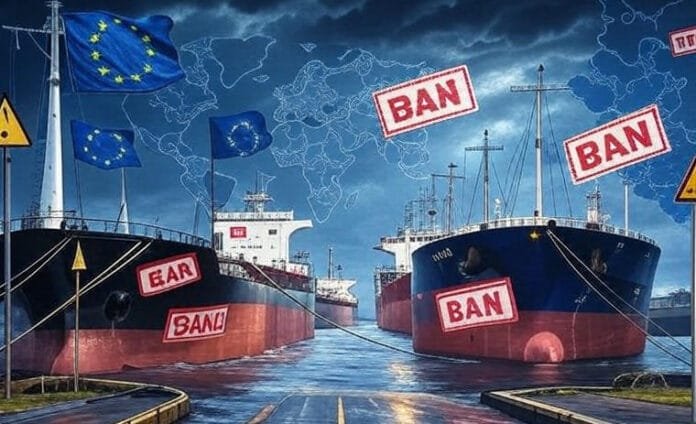The European Union (EU) has introduced sweeping new restrictions under its 18th sanctions package—targeting refined petroleum products originating from Russian crude, regardless of the refining country. This move has sent shockwaves across India’s energy export sector, posing an imminent threat to nearly $15 billion in petroleum exports, particularly diesel, jet fuel, and petrol.
EU’s New Sanctions: Redefining Energy Trade Boundaries
The EU’s sanctions now prohibit imports of petroleum products from any third country if they are refined using Russian crude oil. This measure is aimed at tightening the noose around Russia’s energy revenue, a critical funding source for its ongoing conflict in Ukraine.
Under this framework, India, UAE, and Turkey—nations that have ramped up purchases of discounted Russian crude post-2022—now face restricted access to the lucrative European energy market. These countries had emerged as alternative hubs refining Russian oil and re-exporting it to the West. However, the EU’s latest clampdown closes this loophole, making compliance mandatory and enforceable.
India’s Energy Exports: A Sharp Decline in the Making
According to the Global Trade Research Initiative (GTRI), India’s petroleum exports to the EU, which stood at $19.2 billion in FY 2023-24, have already slumped to $15 billion in FY 2024-25, reflecting a 27.1% drop. The recent sanctions may shave off an additional $5 billion, putting India’s export ambitions in serious jeopardy.
Key Highlights:
FY2025 Imports: India imported $50.3 billion worth of crude oil from Russia, accounting for over one-third of its total crude imports.
Top Exports at Risk: Diesel, petrol, and jet fuel, all refined from Russian crude, dominate the list of vulnerable products.
Primary Markets Impacted: Netherlands, Belgium, Italy, and Spain—major EU buyers of Indian petroleum—may now reduce or completely halt these imports.
Geopolitical Pressure vs Economic Necessity
GTRI founder Ajay Srivastava has warned that India’s legitimate energy trade with Russia, though compliant under international law, is becoming increasingly untenable amid rising Western geopolitical scrutiny. India must now navigate a delicate balancing act, preserving its economic interests while avoiding sanctions risks and diplomatic fallout with Western allies.
The EU’s move underscores a strategic warning: “Refine Russian oil, and you lose the European market.” For India, which has strategically benefited from cheap Russian crude since 2022, this development alters the calculus drastically.
How India Became a Refining Powerhouse Using Russian Oil
Since the imposition of initial Western sanctions on Russia in 2022, India emerged as one of the biggest buyers of discounted Russian crude. With a highly capable refining industry and access to global shipping and insurance, Indian refiners converted cheap Russian crude into high-value fuels and exported them across the globe, especially to Europe.
Refinery Efficiency as a Competitive Edge:
India’s private refineries such as Reliance Industries (Jamnagar) and Nayara Energy (Vadinar) possess advanced configurations capable of refining heavy sour crude from Russia efficiently.
These complex refineries produce Euro-VI compliant fuels, meeting the EU’s stringent emission norms.
As Russian crude traded at a discount of up to $30 per barrel, India enjoyed significant profit margins on its re-exports.
Now, with the EU’s action, this economic advantage is on the brink of collapse.
Economic Fallout: Beyond Just the Oil Trade
This isn’t merely a blow to India’s export numbers. The ripple effect threatens to impact:
Foreign exchange earnings
Port logistics and shipping companies
Revenue of private refiners
India’s current account balance
Investment in refining capacity expansions
Indian ports such as Kandla, Mundra, and Sikka, which witnessed a sharp increase in petroleum exports, may face volume contraction. Furthermore, refiners that optimized operations based on sustained Russian oil supplies will now need to reassess their sourcing strategy, possibly returning to costlier Middle Eastern or African crude grades.
Potential Counter-Strategies for India
Faced with this abrupt market shift, India must adopt a multi-pronged strategy:
1. Diversify Export Destinations
India must aggressively diversify its petroleum product exports toward Africa, South America, and Southeast Asia, where EU-style restrictions may not yet apply. Countries like Brazil, Indonesia, Kenya, and Egypt offer expanding fuel demand and fewer geopolitical constraints.
2. Enhance Domestic Utilization
Boosting internal consumption of refined products by investing in infrastructure, logistics, and energy access programs could absorb surplus output. Government subsidies for rural electrification, highway expansions, and urban transport could drive fuel demand domestically.
3. Advance Refinery Traceability & Certification
Indian refiners may consider oil traceability certification mechanisms to distinguish non-Russian crude batches. Blockchain-based audit trails or third-party verification might help regain partial access to EU markets by certifying origin compliance.
4. Strengthen Diplomatic Channels
India’s external affairs ministry must initiate structured dialogues with EU counterparts to negotiate flexibilities, phased transitions, or exemptions, especially for long-term contracts already in place.
Impact on Global Oil Dynamics
This move by the EU is also likely to reshape global energy routes:
Russian crude may flow more toward China, Pakistan, and African nations, pushing India into tougher competition for alternative supplies.
Middle East producers like Saudi Arabia and Iraq may gain greater leverage, knowing India must now reduce Russian intake.
Global freight rates for compliant crude oil cargos could rise due to route recalibration.
Conclusion: A Defining Crossroads for India’s Energy Diplomacy
The EU’s ban on Russian-origin refined fuels is not merely a sanctions update—it is a strategic energy redirection with direct implications for India’s $15 billion export portfolio. As the global oil map undergoes forced realignment, India must pivot swiftly, leveraging its refinery strengths, market diplomacy, and policy innovation to shield its energy economy.
In this era of high-stakes energy politics, India stands at a crucial juncture. The choice is between economic expediency and strategic foresight—and how we respond will determine the trajectory of India’s energy future.
















